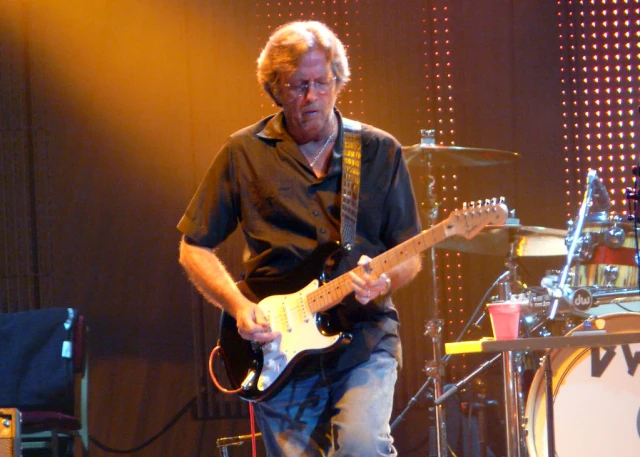
Eric Clapton was one of my first musical heroes. As an aspiring blues guitarist of soaring ambitions and slight talent, I played his greatest album — Derek and Dominos’ “Layla” (No. 6 on my all-time list, by the way) — over and over again, trying to figure out what he was doing on songs like “Key to the Highway” and “Have You Ever Loved a Woman.” I saw him at the Boston Garden in 1974, one of my first rock concerts. A full-page ad for that show from one of the alt-weeklies (probably The Real Paper) was on my bedroom wall. Clapton was and is a great guitarist, and by all appearances seemed to be a humble, generous ambassador for the Black music that he championed.
But appearances can be deceiving. Throughout this year, bits and pieces of Clapton’s dark side have been emerging. He came out as an anti-vaxxer along with Van Morrison (at least we already knew he was a jerk). Old racist comments surfaced, along with his cringe-inducing I-apologize-but-not-really reactions.
Now Rolling Stone has pulled it all together (sub. req.) and added some details. A 5,000-word-plus story by David Browne reports on Clapton’s racist outbursts, focusing especially on a drunken rant he delivered at a Birmingham concert in 1976 during which he offered up some vile racial slurs and spoke favorably of a British politician named Enoch Powell, described in the article as the George Wallace of the U.K. Over the years Clapton has repeatedly apologized and blamed it on the booze; he has also repeatedly said it was no big deal and that he continues to think it was “funny.”
His current anti-vax crusade extends to sending money to a down-on-their-luck anti-vax band and playing shows in the U.S. before maskless audiences in the Deep Red South. As Browne writes:
For the longest time, anyone asked to rattle off Clapton’s accomplishments would cite the vital role he played in bringing blues and reggae into mainstream culture and his prodigious guitar playing. (There was a reason someone spray-painted “Clapton Is God” on a London subway wall in the mid-Sixties.) Others couldn’t help but remember the horrific tragedy of his four-year-old son’s death and the emotional catharsis of “Tears in Heaven.” But the current controversy is prompting a fresh examination of Clapton’s past behavior, which includes jarringly racist statements he made in the early part of his career. How did we get from admiration and empathy to bewilderment and even a feeling of betrayal?
Although it wasn’t in the Rolling Stone article, Twitter reminded me this week that Clapton admitted to raping his wife in the 1970s, back when he had serious alcohol and heroin addictions. That’s not an excuse — it’s just evidence of how low he had sunk.
Here we get to the age-old dilemma about separating the art from the artist. Clapton is a great artist. He’s also a racist anti-vaxxer who’s also admitted to sexual assault. That said, John Lennon, Miles Davis and any number of other great musicians could be pretty terrible people as well. Do we still want to listen to Clapton’s music? Is it possible to do so without thinking about Clapton the person?
Clapton has had an odd career, as he’s remained at least somewhat in the spotlight even though his last good album, “461 Ocean Boulevard,” was released nearly 50 years ago. He’s done it on the strength of a few hit singles here and there, especially the aforementioned “Tears in Heaven”; an overpraised blues album, 1994’s “From the Cradle,” that’s derivative and flat compared to “Layla”; and his live performances, which have included multiple televised benefit concerts on which his guitar wizardry has stolen the show.
Now, at 76, wealthy and successful, he’s tearing down his legacy. Maybe we can let Buddy Guy remind Clapton of how lucky he’s been. “The man can play,” he told Rolling Stone. “If somebody’s good, I don’t call you big, fat, or tall. He just bent those strings, and I guess he bent them right on time. The British exploded the blues and put it in places we didn’t put it. I wish I could have had the popularity he got. Maybe I wouldn’t have to work so damn hard.”
Leave a Reply